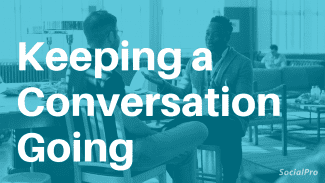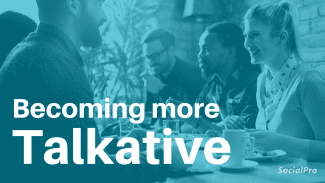“I just wish the ground would swallow me up when I say things like that…”
Everyone says the wrong thing from time to time. If it’s an occasional slip-up, people will usually just move on. If you’re reading this article, you’re probably finding that it’s a bigger problem than that.
So what could be the reason for saying stupid things?
Common reasons for saying stupid things are poor social skills, not thinking before talking, telling too harsh jokes, trying to fill out awkward silence, or suffering from ADHD. Sometimes, social anxiety can lead us to believe we say stupid things even when we don’t.
Saying awkward or stupid things in a conversation presents two problems. As well as the social awkwardness (and sometimes hurt feelings) that come from what you have said, regularly saying the wrong thing can make you feel socially awkward and anxious and make it difficult for you to enjoy social events.
Sometimes it leads to an awkward moment or pause in the conversation. Other times it can lead to you upsetting or offending people when you really didn’t mean to.
If you find yourself saying things that you later regret, the most important thing to remember is that there are strategies you can learn to help. Here are my best tips for how to avoid embarrassing yourself, and to help you recover when you do.
Sections
- Feeling like you say stupid things when you don’t
- Speaking without thinking
- Insulting people
- Telling jokes that fall flat
- Saying stupid things to avoid silence
- Having ADHD
- Overcoming saying something awkward
- Embarrassing oneself in group conversations
- Knowing what to say when someone’s having a hard time
Feeling like you say stupid things when you don’t
Lots of us overestimate how often we say stupid or awkward things. We also overestimate how much it is going to influence what other people think of us.[1] If you’re not sure about this, try keeping track of every silly thing that other people say in conversation. My guess is that you’ll struggle to remember them after a few minutes.
Ask for an outside opinion
A trusted friend can provide a useful reality check to help you understand whether you come across to others as saying lots of stupid things.
It might be better to ask about a general perception, rather than a specific conversation. Asking “I said so many stupid things last night, didn’t I?” is unlikely to get you a really objective answer. Instead, try “I’m worried that I come across as saying lots of stupid things and being thoughtless, but I’m not sure. I’d really value your opinion on whether this is something that I should work on”. If you feel that your friend is more concerned with making you feel better than giving you an honest answer, you could explain “I know you understand me. I’m just worried about how I come across to people who don’t know me that well”.
Speaking without thinking
I’ve spent years learning to think before I speak. It was so bad that there was a standing joke amongst my friends that I was often as surprised as everyone else by the words I’d just said. Just to give you an example, I was sat in my office one day when my boss came in and announced
“Natalie, I’d like all of those documents written up and ready to go out by Tuesday”
In context, this was a huge amount of work and a pretty unreasonable request, but my mouth decided to reply without getting clearance from my brain first.
“I’d like world peace and a pony”
Surprisingly I wasn’t fired, but it certainly wasn’t a great thing to have said. It happened because I wasn’t concentrating and I didn’t stop to think. I had been engrossed in my work before my boss walked in and most of my brain was still in the document I’d been working on.
Pay attention to the conversation
I only stopped making these kinds of comments when I started really paying attention to conversations. If the same situation happened again, I would probably say something like “Hold on a second”. I would then stop what I was doing, turn around to look at my boss, and say “Sorry, I was just in the middle of something. What do you need?”.
Paying attention to a conversation means that you are listening to the other person and thinking about what they are saying. This makes it less likely that you’ll say something thoughtless.
Insulting people
“Sometimes I say stupid, meaningless and sometimes mean things to other people which I always regret the second after I say it. I try to control this but I don’t want to censor everything I say because that wouldn’t be me.”
A certain amount of friendly teasing or banter with friends is perfectly normal in lots of social situations. It can become a problem if you find that you are insulting people or saying mean things that you later regret.
Often, this is the result of allowing your comments to become habits, rather than thinking about what you really mean.
Learn to self-censor
Learning to not say things you regret (self-censoring) can help you to only say things that actually add to the conversation. You might feel that censoring yourself is somehow “fake” or stops you from being your authentic self, but that isn’t true. The things you say without thinking often aren’t actually reflective of your true feelings. That’s why you regret saying them afterward.
Self-censoring isn’t about not being you. It’s about making sure that the things you say are really how you feel. Before you speak, try asking yourself whether what you are about to say is true, necessary, and kind. Taking a moment to check your comment for these three things can help you to filter out automatic mean comments.
Telling jokes that fall flat
One of the most awkward moments in a conversation is when you try to make a joke and it just fails. Sometimes, you know as soon as you’ve said it that it was the wrong thing to say but other times you’re left wondering exactly what went wrong.
Making a joke that doesn’t land or worse, one that insults people, is usually down to one of these problems
- Your joke wasn’t right for your audience
- Your audience doesn’t know/trust you enough to know that you were joking
- People weren’t in a jokey frame of mind
- You took your joke too far
Think about why you’re telling the joke
Most of these problems are alleviated by thinking about why you want to tell a particular joke before you start.
Usually, we want to tell a joke because we think the other person will enjoy it. Ask yourself whether you’re sure that your joke is something that the person you are talking to will find funny. Remember that this is specific. The off-color joke that had your friends in hysterics might not have the same effect on your church pastor or your boss.
Saying stupid things to avoid silence
Silence, especially in a conversation, can be deeply uncomfortable and even scary. Silence allows time for all of your worries and insecurities to make themselves heard.
For most of us, our natural reaction to silence is to say something. As the silence becomes longer, we feel more and more awkward and you might want to say almost anything to help reduce the tension.
Unfortunately, that’s where the problem comes in, as we’re often in so much of a panic that we don’t really think through what we say.
Learn to become comfortable with silence
The best way to become comfortable with silences is experience. During my counseling training, we had to spend time every week getting used to sitting in silence with another person, and I can tell you it’s hard to sit looking at a roomful of people for 30 minutes in silence.
You don’t need to go that far, but you will find it easier to avoid saying stupid things if you can become comfortable enough with silence that you don’t panic. There is a three-step process that can help you with that.
Step 1: Keep a question in reserve
During a conversation, try to keep one question in mind that you can ask if the conversation dies down. It can be about any topic you’ve discussed earlier in the conversation, for example, “I was thinking about what you said about training for a marathon. How do you find the time to do that?”
Step 2: Count to five after the conversation dies down
If the conversation starts to falter, make yourself count to five in your head before you speak. This can help you to become used to silence and also allows you time to remember your question. It also allows the other person to re-start the conversation if they have questions.
Step 3: Break the silence with your question
If you’re jumping back a few topics, make sure to give context to your question. Try saying “What you said about traveling got me thinking. What do you think about…”.
Getting used to small silences can give you the confidence to pause before you speak, which can make it easier to avoid saying the wrong thing.
For more tips, see our article on how to be comfortable with silence.
Having ADHD
One of the characteristic difficulties for people with ADHD is that you often blurt out whatever you are thinking, no matter who you are with. It can also lead you to interrupt other people.[2]
Often these verbal impulses lead to you feeling an almost physical need to speak. Other times, you might be worried that you will forget what you wanted to say.[3]
Ask others to help you recognize your verbal impulses
The first step to reducing how often you blurt out the wrong thing is to notice when you’re doing it. You can do this yourself, and a journal can be helpful to keep track of it, but having a trusted friend who can point out the times you miss can be really helpful.
It can also be helpful to write down anything that you’re worried you might forget.
Overcoming saying something awkward
We’ve all experienced that moment of realizing that we’ve just said completely the wrong thing. The difference for socially skilled people is that they accept it and move on.
Excessive worry about saying the wrong thing, or reminding yourself of your verbal mistakes over and over are both signs of social anxiety.[4]
Learn to forgive yourself
One of the hardest things to do when you struggle with social anxiety is to learn to forgive yourself for saying the wrong thing. Instead, we self-punish. We tell ourselves that we are thoughtless and beat ourselves up about it.
Remind yourself that people pay much less attention to us than we assume they do.[5] Most people have probably forgotten the stupid thing you said 5 minutes after you said it, if not sooner!
If you have hurt someone, apologize straight away. Often, we stay silent when we know that we really should apologize. We feel awkward so we avoid the conversation. This can lead to you feeling worse about yourself. Being brave and saying “That comment was thoughtless and hurtful. You didn’t deserve it and I actually didn’t mean it. I’m sorry” can actually lead you to feel better about yourself and helps to draw a line under the problem.
Embarrassing oneself in group conversations
Joining a new group used to be one of the times that I was most likely to say something stupid or embarrassing. I would blurt out a comment that would have had a different group of friends laughing or nodding along with me and this new group would look at me as if I had two heads. This can be a real barrier to joining new groups.
It wasn’t until I took a step back and wondered why I always made the same type of mistake with a new group that I realized what I was doing. I wasn’t taking the time to read the room before I spoke.
Learn to read the room
‘Reading the room’ is about spending a little bit of time just listening to the conversation and not joining in. When you join a new group, spend at least a few minutes just listening to the conversation. Try to pay attention to the both content and the style.
Think about the subjects that are being discussed. Is the group discussing politics and science? Are they chatting about their favorite TV shows? Are there any topics that seem to be being avoided? If you understand the typical topics of conversation for the group, you know which topics are likely to interest everyone else when you want to join in.
Try to also pay attention to the tone. Is everything very lighthearted? Are people talking about serious or upsetting issues? Matching the tone of the group is often even more important than matching the topic.
Knowing what to say when someone’s having a hard time
One of the hardest times to know what to say is when someone is going through something difficult. When things get really tough, most of us are left not knowing what to say or saying something that we later regret.
Probably the most important thing in difficult circumstances is not to offer platitudes. Telling someone that “it’ll work out ok in the end” or “every cloud has a silver lining” is actually more about allowing you to feel like you’ve helped than it is about offering them compassion or help.
Show empathy, without trying to fix problems
Instead of platitudes, offer empathy and understanding. Rather than “I’m sure it’ll work out”, try saying “That sounds incredibly difficult. I’m so sorry.” or “I know I can’t fix it, but I’m always here to listen”.
It’s usually best not to tell the other person about your similar experience unless they ask. Try not to say “I understand” unless you’re really sure that you do. Instead, try “I can only imagine how that feels”.














Think. Do not speak out of school. Don’t ask stupid questions.
LISTEN. LISTEN LISTEN. Don’t start a comment with “but I thought”.
Understand that you can learn something from every person you speak with.
I have a low IQ.
Sometimes I try to cover up my mistake by saying a whole bunch of things so the one stupid thing will get lost among many other things, but then I get nervous and end up just saying more stupid stuff. Sometimes it’s better to just shut my mouth.
I have resorted to not speaking in staff meetings. It saves my self image.
what do you do if you have to speak and your job depends on it?